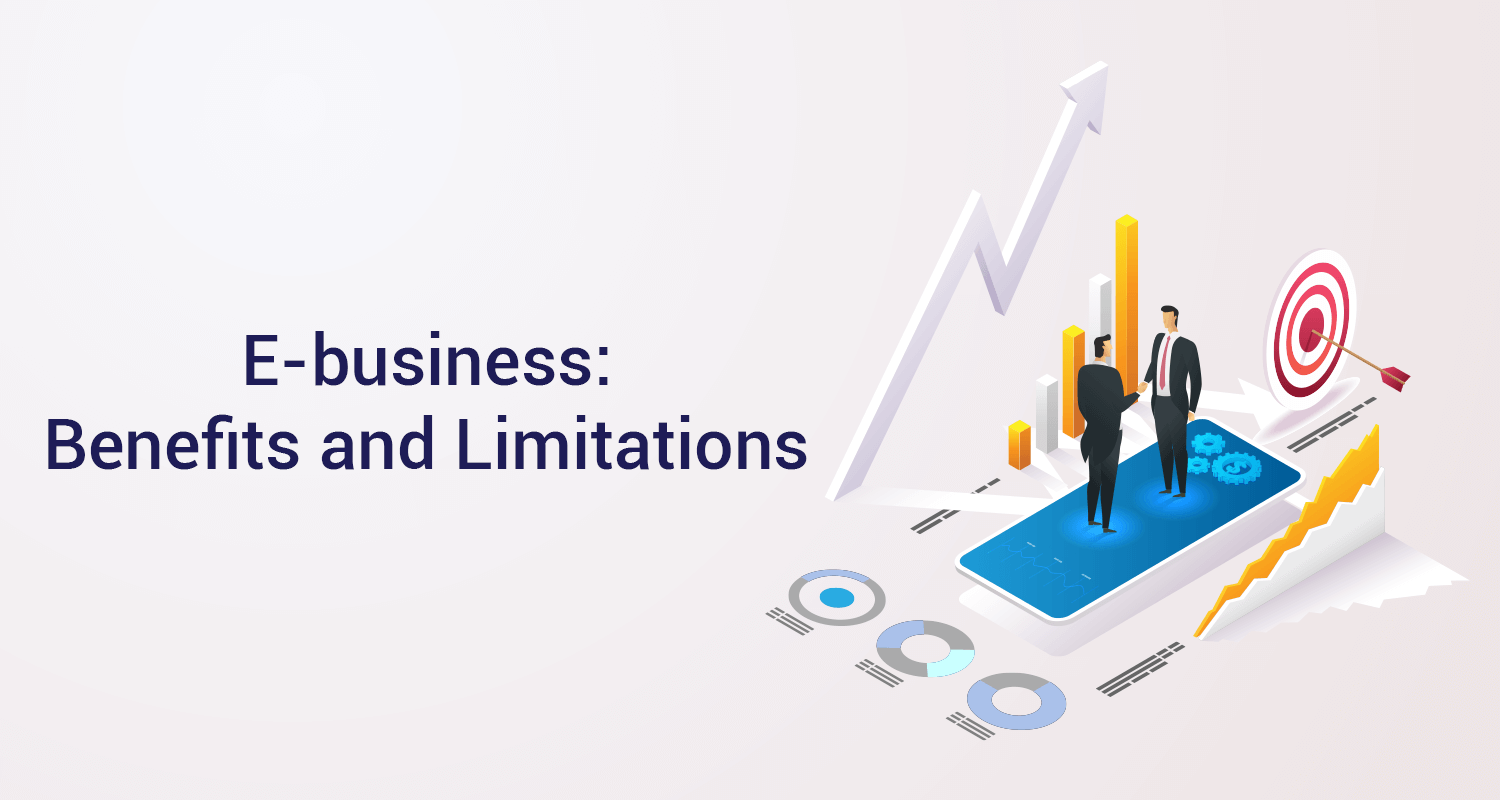E-Business: Meaning, Benefits & Limitations

Our lives are dependent on the next purchase we make with just a few clicks. We are living in an era of e-business, a phenomenon unlike we have ever seen before. Let us not think of it to be just an online storefront but understand its dynamism and the ecosystem it has created. e-business is now reshaping industries worldwide. What has been the breakthrough innovation of the new world system and what are the challenges of e-business? Let us explore the world of e-business and unveil the opportunities and obstacles of this digital revolution. Click here to know about difference between e-business and traditional business.
What is the concept of e-business?
If you conduct your business activities over the Internet or on any other computer network, you have done e-business or Electronic Business. Business activities like trade, commerce, and industry, all forms of businesses can be done electronically today and this is fast becoming a way of life. Even for merchants, using the Internet and other computer networks and technologies is a superior form of customer service as it increases sales and significantly reduces costs. Effective and efficient computer networks with more security are mainly used for e-business.
What are the benefits of e-business?
There are several benefits of e-business, which include
- Simple setup:
A simple website or online store can be created with user-friendly platforms without extensive IT knowledge. - No physical infrastructure required:
you don't need a physical location or inventory to operate the business. Online retailers, digital product sellers, or service-based businesses can operate from anywhere. - Networking is crucial:
Building relationships and connections is more crucial for growth than financial capital. A strong network of customers and partners can lead to increased sales and business opportunities. - 24/7/365 Operations:
The business can operate round-the-clock, catering to customers worldwide and providing flexibility to business owners. Online shopping platforms, digital services, and customer support can be available at any time. - Work from anywhere at any time:
Employees or business owners can work remotely, providing flexibility in work location and hours. - Seamless communication with stakeholders:
Effective and efficient communication channels exist between the business, customers, and suppliers. Email, instant messaging, and online platforms facilitate quick and easy communication. - Instant Exchange of information:
Information can be shared and accessed digitally with ease. Online document sharing, data transfer, and collaboration tools enhance efficiency. - Quick electronic fund transfers:
Financial transactions can be processed rapidly and securely through digital platforms. Online payments, digital wallets, and bank transfers streamline financial operations. - Easy Global Market Access:
E-commerce platforms and online marketplaces allow businesses to expand their reach. The business can reach customers and suppliers across geographical boundaries. - Minimal Paperwork:
Digital documents and processes replace traditional paper-based systems. Electronic invoices, contracts, and records reduce storage and processing time. - Prompt Approval Processes
Administrative tasks and regulatory compliance can be handled efficiently through digital platforms. Online government portals and digital document submission streamline bureaucratic processes.
What are the limitations of e-business?
There are some limitations of e-business and they are discussed here:
Lack of Human Interaction
-
Limited Personal Touch: E-commerce often lacks the face-to-face interaction essential for certain products or services.
Speed and Reliability Issues
- Delivery Delays: Physical goods delivery can slow down the overall process.
- Technical Glitches: Website or system failures can hinder user experience and sales.
User Challenges and Concerns
- Digital Divide: Not everyone is tech-savvy, limiting e-commerce reach.
- Identity Verification: Online transactions can pose challenges in verifying parties involved.
- Cybersecurity Threats: Risks of fraud, data breaches, and hacking can deter customers.
Organizational Challenges
- Resistance to Change: Implementing e-commerce can face opposition within organizations.
- Privacy and Ethical Concerns: Electronic monitoring of employees raises privacy and ethical questions.
Sapna aapka. Business Loan Humara.
Apply NowWhat are the advantages and disadvantages of e-business for businesses, from the merchant’s point of view?
The table here tries to explain the advantages and disadvantages:
| Advantages | Disadvantages |
| 24/7 Availability | Quicker Market Share Loss |
|
- Operates round-the-clock |
- High competition can lead to faster market share loss |
|
- Eliminates the need for physical staff thereby reducing overhead costs |
- Requires creative strategies to continue customer loyalty |
| Global Reach | High Startup Costs |
|
- Expands customer base worldwide |
- High initial costs, especially for marketing and SEO |
|
- Tools for tracking visitor engagement |
- Must be creative to stay competitive on a budget |
|
- Lower startup costs compared to physical stores |
- Pay-per-click advertising can help manage costs |
| Quick Updates | Handling Returns |
|
- Easily update promotions and content |
- Managing returns, refunds, and chargebacks |
|
- Utilizes email marketing and social media |
- Any slightest mismanagement can lead to legal and financial issues |
| Customer Profiling | Innovation Pressure |
|
- Collects data on customer behaviour |
- Must innovate to stand out in a competitive market |
|
- Enables personalised marketing |
- Need to streamline the supply chain and provide and also personal touch |
| No Location Disadvantage | Customers Can Remain Anonymous |
|
- Eliminates the effect of physical location |
- Limited direct interaction with customers |
|
- Virtual assistants provide 24/7 support |
- Transactions may be limited to single interactions |
Here are some added advantages:
Saving Time and Cost
- Streamlines purchasing and dispatch
- Reduces operational costs
Scalability
- Easier to expand online operations
Reviews & Ratings
- Customers can leave and read reviews
- Enhances products and services
Increased Profit Margin
- Lower setup and operational costs
- Better financial management tools
Targeted Marketing
- Cost-effective digital advertising
- Better ROI compared to traditional methods
What are the advantages and disadvantages of e-business for customers?
Here’s summarising the advantages and disadvantages of e-business for consumers:
| Advantages | Disadvantages |
| Saving Time and Cost | Product Description |
|
E-commerce lets consumers to shop from anywhere, saving time and avoiding travel costs |
Multimedia images cannot fully replicate the in-store experience, making it hard to assess product quality and size |
| Convenience | Cost and Shipping |
|
Consumers can shop from the comfort of their homes or offices |
Additional costs such as shipping, taxes, and transactions can affect product affordability |
| Not Dependent on Opening Hours | Poor Internet Connection |
|
E-businesses offer 24/7 access, allowing transactions at any time. |
Limited internet connectivity in some regions can delay online shopping experiences |
Here are some added advantages:
Easy to Manage Business InternationallyInternational transactions are facilitated, reducing the need for physical office visits
Anonymity
E-businesses can provide privacy and protection of personal data.
Immediate Price Comparison
Consumers can easily compare prices across different online platforms to find the best deals
FAQs
Q1. What is the scope of e-commerce?Ans. E-business contains the management functions of planning, organising, marketing, and production conducted electronically. Moreover, functions that are also covered are inventory management, product development, human resource management, and accounting and finance.
Q2. What is the role of e-commerce in the economy of the country?Ans. e-commerce influences the economy significantly by nurturing innovation, encouraging global expansion, increasing productivity, creating jobs, driving better shopping experiences, and shaping the business environment overall.
Q3. What is the risk in conducting e-business?Ans. Some risks that concern e-business are mainly transaction risks, data storage and transmission risks, and intellectual property and privacy risks.
Q4. What is the objective of e-business?Ans. The key objectives of an e-business strategy usually include the following: Achieving Targets, Strengthening Consumer Loyalty, Client Maintenance, and Management.
Sapna aapka. Business Loan Humara.
Apply NowDisclaimer: The information contained in this post is for general information purposes only. IIFL Finance Limited (including its associates and affiliates) ("the Company") assumes no liability or responsibility for any errors or omissions in the contents of this post and under no circumstances shall the Company be liable for any damage, loss, injury or disappointment etc. suffered by any reader. All information in this post is provided "as is", with no guarantee of completeness, accuracy, timeliness or of the results etc. obtained from the use of this information, and without warranty of any kind, express or implied, including, but not limited to warranties of performance, merchantability and fitness for a particular purpose. Given the changing nature of laws, rules and regulations, there may be delays, omissions or inaccuracies in the information contained in this post. The information on this post is provided with the understanding that the Company is not herein engaged in rendering legal, accounting, tax, or other professional advice and services. As such, it should not be used as a substitute for consultation with professional accounting, tax, legal or other competent advisers. This post may contain views and opinions which are those of the authors and do not necessarily reflect the official policy or position of any other agency or organization. This post may also contain links to external websites that are not provided or maintained by or in any way affiliated with the Company and the Company does not guarantee the accuracy, relevance, timeliness, or completeness of any information on these external websites. Any/ all (Gold/ Personal/ Business) loan product specifications and information that maybe stated in this post are subject to change from time to time, readers are advised to reach out to the Company for current specifications of the said (Gold/ Personal/ Business) loan.



